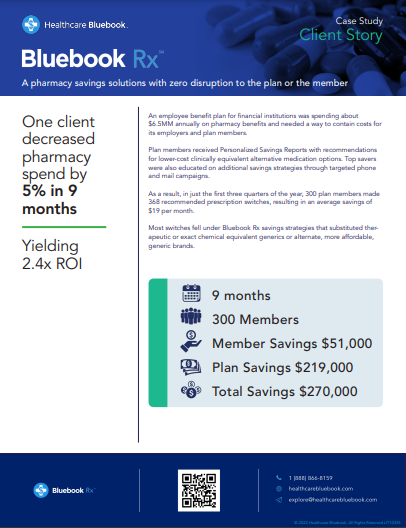-1.jpeg?width=1000&height=582&name=AdobeStock_838035083%20(1)-1.jpeg) Glucagon-like peptide-1 (GLP-1) weight loss drugs have become quite popular for those living with diabetes and/or obesity. These drugs can have positive impacts on patients’ lives, but they also have a large financial impact on employers. Many employers generally cover GLP-1 weight loss drugs for diabetes, but not all are on board with covering them for obesity due to the financial implications.
Glucagon-like peptide-1 (GLP-1) weight loss drugs have become quite popular for those living with diabetes and/or obesity. These drugs can have positive impacts on patients’ lives, but they also have a large financial impact on employers. Many employers generally cover GLP-1 weight loss drugs for diabetes, but not all are on board with covering them for obesity due to the financial implications.
What are the financial impacts of GLP-1 drugs on employers?
The affordability of GLP-1 weight loss drugs impacts employees and employers alike. The list price for GLP-1s ranges between $936-$1,349 before insurance or discounts kick in. It’s common for people to take these drugs for several months or years, which further contributes to already-high benefits costs.
According to the Centers for Disease Control and Prevention, nearly 42 percent of U.S. adults have obesity, and approximately 9 percent have severe obesity. The economic reality of this is that employers must decide how to cover GLP-1s (or if they’ll cover them at all).
Many employers are starting to make strides toward deciding how they’ll cover these drugs. One survey found that approximately 57 percent of employers cover GLP-1s for diabetes, which is up from 49 percent in 2023. The same survey also found that 34 percent of employers cover GLP-1 drugs for weight loss and diabetes, which is up from 26 percent in 2023.
Demand for GLP-1 drugs only continues to rise, so employers are poised to continue spending more on these drugs. As demand increases, drug companies will likely continue to develop more GLP-1s for weight loss, and this competition will drive down prices, but until that happens, employers must come up with a strategy to curb spending.
How are employers addressing costs?
Many employers are relying on techniques such as utilization management, prior authorization, and body mass index or comorbidity requirements to control costs. These tactics help employers ensure these drugs aren’t being used irresponsibly, such as for crash dieting, which can diminish available supply and drive up costs.
However, another effective strategy that can help manage costs for GLP-1 weight loss drugs and other medications is to explore alternate prescription sourcing, such as coupons, copay cards, and supplemental benefit programs, such as Bluebook Rx.
Bluebook Rx identifies overpriced prescriptions and suggests lower-cost comparable alternatives, helping members and employers save on waste and overspending. A Bluebook Rx expansion also helps address the rising cost of GLP-1s, enabling members and employers to lower their GLP-1 expenses.
What are the benefits of GLP-1 weight loss drugs?
The financial implications of GLP-1 weight loss drugs may be high, but for many people, the benefits are quite significant.
Weight Loss
GLP-1s can help with weight loss by mimicking the body's natural processes to control appetite. These drugs may help people lose approximately 15-20 percent of their body weight, which is a range of weight loss that was only previously achieved through bariatric surgery. This type of surgery can put a lot of strain on patients’ bodies, which GLP-1s can help them avoid.
Health Impacts
Obesity can lead to serious health impacts, such as heart disease, stroke, type 2 diabetes, some cancers (colon, breast, and endometrial), and musculoskeletal disorders, such as osteoarthritis. Health problems such as these start when someone is slightly overweight, and they then worsen as someone gains more weight.
GLP-1s help those with obesity minimize potential side effects that may arise from obesity, such as kidney or heart problems. These drugs also may lower the risk of heart disease, heart failure, stroke, and kidney disease. GLP-1s may also improve blood pressure and cholesterol levels and help control blood sugar.
Reduced Costs for Other Health Conditions
GLP-1s may help companies reduce health costs associated with obesity and other conditions arising from obesity. By preventing chronic conditions that lead to specialists or hospital admissions, employees and employers could save money on these visits and the costly prescriptions that result from them. This also translates to less time off work, improved work performance, and reduced overall healthcare costs.
Discover how to manage costs while supporting employee well-being.
GLP-1s have significant benefits for people, but they also have a large financial impact on employers and employees alike. Discover how to curb costs for GLP-1s and other prescriptions by adding Bluebook Rx to your benefit offering.
As part of our ongoing commitment to delivering innovative cost-saving solutions, Healthcare Bluebook is proud to now be part of the Vālenz Health family. Valenz Health’s integrated health platform further enhances Bluebook Rx’s capabilities, enabling accelerated program adoption and engagement, ensuring better outcomes for both employers and their members.
